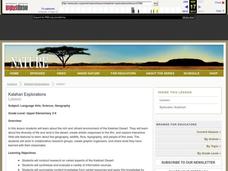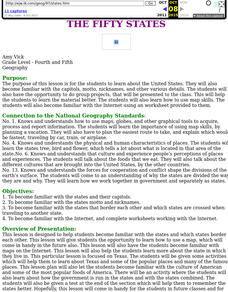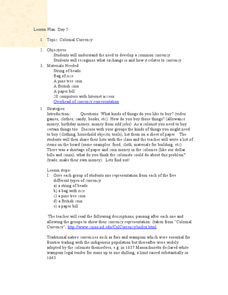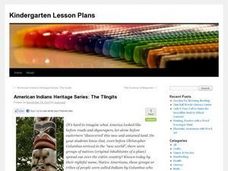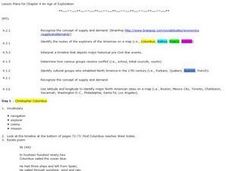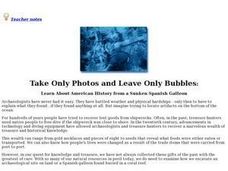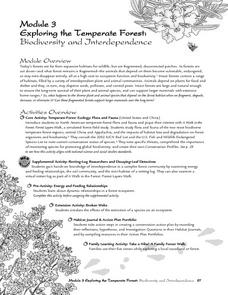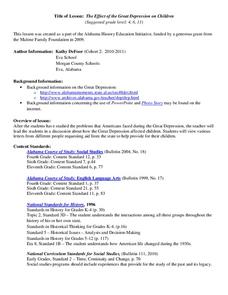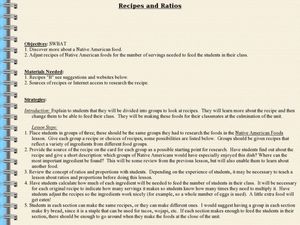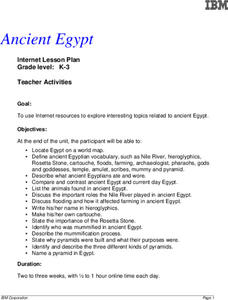Curated OER
Hawaii's Freshwater Animals - Species Report
Students explore biology by creating a report for the class. In this oceanography lesson, students research and identify the survival characteristics of a list of freshwater animals by utilizing the Internet and library. Students...
Curated OER
Kalahari Explorations
Students explore world geography by completing graphic organizers and researching the Internet. In this Kalahari desert lesson, students identify the geographic location, weather and creation of the Kalahari desert. Students define a...
Curated OER
The Fifty States
Learners become familiar with the states. They study capitols, mottos, nicknames, and other various details. They create group projects that be presented to the class.
Curated OER
Guess Who's Coming to Dinner?
Students work in groups to imagine, research and simulate a dinner party involving an author, a fictional character, and a significant historical figure as dinner guests. The activity uses Geoffrey Chaucer's Canterbury Tales and the time...
Curated OER
Topography of Africa
Students study Africa's diverse landscape and investigate how these features impact the available water supply, food sources, and population distribution of the continent. They compare topographical features and
their affect on each...
Curated OER
Colonial Currency
Fifth graders develop a common currency. In this colonial currency instructional activity, 5th graders exchange beads, rice, coins, and paper bills for goods and services. Students explore web tools to research ways colonists used money,...
Curated OER
Introduction to Hours & Minutes
First graders identify, interpret, and gain proficiency in using a clock to tell time to the hour and determine how many minutes are in an hour. They identify and list what they do as they travel through their dayand how much time you...
Curated OER
The Oregon Trail
Students use maps and diagrams to examine the Oregon Trail. In groups, they create their own poster of the trail showing the different types of artifacts found along the way. To end the lesson, they identify the sources of water and...
Curated OER
Whispers from the Past
Students use various primary sources on the Internet to travel on the Underground Railroad
Curated OER
American Indians Heritage Series: The Tlingit's
Students study the Native American culture of the Tlingits and discuss relevant information regarding their way of life. Students create their own musical Tlingit rattles using toilet paper rolls and rice. They make and decorate their...
Curated OER
An Age of Exploration
Students investigate U.S. history by examining North American timelines. For this American exploration lesson, students research the events that led to Columbus finding America and participate in a jeopardy game regarding his adventure....
Curated OER
Take Only Photos and Leave Only Bubbles: Learn About American History from a Sunken Spanish Galleon
Students simulate the research process of investigating a shipwreck. In small groups, they conduct Internet research, and develop and write a proposal for excavation of the archaeological site.
Curated OER
Exploring the Temperate Forest: Biodiversity and Interdependence
Middle schoolers examine the consequences of cutting down large amounts of forests throughout the world. In groups, they use the internet to complete a module taking them on a tour through different temperate forests. To end the lesson...
Curated OER
Ethnobotany Research Paper
Students are introduce and discuss Ethnobotany and develop their own research writing. Pupils research plants that have already been identifyed as having medicinal or cultural/historical value around the world. They investigate...
California Polytechnic State University
Australian Geography Unit
At the heart of this resource is a beautifully detailed PowerPoint presentation (provided in PDF form) on the overall physical geography of Australia, basic facts about the country, Aboriginal history, and Australia culture and lifestyle.
Virginia Department of Education
The Cycles of Nature
Encourage peer collaboration and assist with the creation of visual aids to identify carbon, water, and nitrogen cycles as your class learns more about nature. They discuss relative information, create a visual aid...
Missouri Department of Elementary
Equine Science
Did you know that horses have two sets of teeth? There is much to learn about horses, of course, and those interested in equine science will learn much from a 10-lesson agricultural science course that covers not only equine dental...
Chicago Botanic Garden
Impacts of Climate Change
Scholars become experts on the eight major impacts of climate change through a jigsaw and grand conversation. They then research and present what they learned about effects specific to their region.
Sharp School
Travel Brochure Project
Designing a travel brochure is a classic project that will help your class members develop a variety of skills, such as researching informational texts, designing creative visual products, and communicating what you have learned.
Alabama Department of Archives and History
The Effect of the Great Depression on Children
How did the Great Depression affect children? Sometimes studying the Great Depression means only studying about how it affected adults, however, relating the experiences of children and peers their age to themselves may make the...
Curated OER
Recipes and Ratios
Students use ratio and proportions to adjust recipe size. In this middle school mathematics lesson, students investigate Native American food and adjust the recipe size for said foods to the number of servings needed to feed the...
Curated OER
Weight Control
Middle schoolers study the importance of a healthy diet. In this weight control lesson students divide into groups and develop a healthy lunch menu.
Curated OER
Ancient Egypt
Students use the internet to research topics on Ancient Egypt. They practice using new vocabulary and identify the types of food they ate and clothing they wore. They explain the role of the Nile as well.
Curated OER
Frogs: Fact or Folklore
Students discover how frogs are adapted to their environment. They view and discuss a Discovery Channel video on frogs and the myths surrounding frogs. In small, groups they compile data on frogs from the internet to create a Frog Fact...



